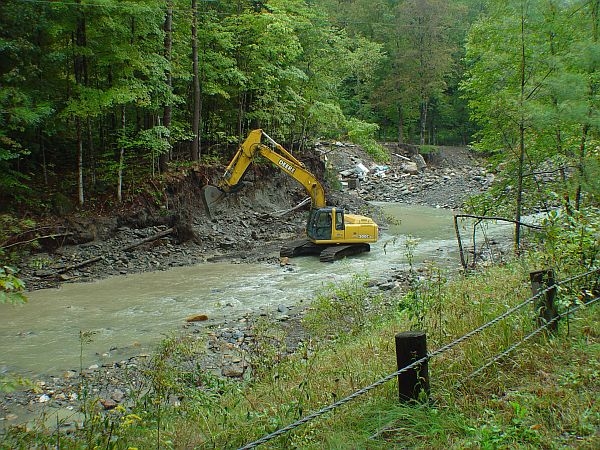 (Host) Tropical Storm Irene washed roads into rivers and coated farm fields with gravel.
(Host) Tropical Storm Irene washed roads into rivers and coated farm fields with gravel.
The state Agency of Natural Resources has allowed work crews to clean up the material and move excavators into streams to clear stream channels.
Environmentalists say the state has gone too far, and permitted work that will have negative consequences in the long-term.
But as VPR’s John Dillon reports, Governor Peter Shumlin says the digging in streams should continue.
(Dillon) Earth moving equipment digs in the Rock River in South Newfane. This is a sound heard all over the state as work crews dredge rock and debris out of streams.
But until the Irene emergency, the state had not allowed gravel extraction from rivers. The practice was banned two decades ago because of the impact on habitat – and the concern by river scientists that excavating stream channels actually makes future floods worse.
Christopher Kilian is Vermont director of the Conservation Law Foundation in Montpelier.
(Kilian) "The current path we’re on will make our rivers more dangerous and unstable, and will reverse 20 years of recovery from terrible gravel extraction activities that had just damaged our rivers for years."
(Dillon) Environmentalists have asked the state to halt the widespread work in rivers. But Governor Peter Shumlin isn’t likely to agree.
(Shumlin) "We’re going to have to go in and do some digging – continue digging as they fill up with gravel."
(Dillon) The governor says that while some contractors have gone too far, much of the work has been necessary to reduce future flooding.
(Shumlin) "As the gravel has built up over the last several decades, it has augmented the flooding that led to so much widespread disaster for farmers, for homeowners, and for businesses. And we’ve got to be smarter about it."
(Dillon) The governor was in Waitsfield – a community along the Mad River that has seen some heated debate over gravel extraction in the weeks since Irene. Charlie Hosford is a select board member.
(Hosford) "I’d say right now it’s pretty intense. Anytime someone sees a yellow machine near the water – which hasn’t occurred in many years because no permissions were given out for that sort of thing – people see that as dredging, as gravel mining, or degradation of stream beds."
(Dillon) But Hosford points out Vermonters have long settled in floodplains, farming the fertile fields and building villages near streams. He says we have to manage the rivers to some extent.
(Hosford) "And to do that we need some incremental maintenance as it passes through those settlements.
(Dillon) But environmentalists have cited the agency’s own experts as they ask the Shumlin administration to halt the extensive work in streams. Caitrin Noel is director of Friends of the Mad River. She says the state’s scientists know that straightening and dredging a waterway accelerates stream flow and makes flooding worse downstream.
(Noel) "It’s been documented around the world how rivers respond. And this is based on the laws of physics, laws that we can’t change."
(Dillon) Noel and other environmentalists say there are clearly cases where work in the water was needed to repair infrastructure or halt property damage. But in a report given to the Shumlin administration, they point to many examples around the state where excavators have damaged habitat and mined the rivers for gravel.
For VPR News, I’m John Dillon in Waitsfield.